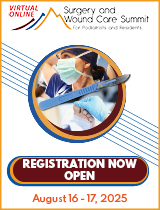|
|
|

|
Search
08/07/2025 Paul Kesselman, DPM
Podiatric Education: Standing at the Crossroads
Congratulations to Dr. Tomczak for his excellent
article in the current Podiatry Management Issue.
This is an eye-opener for sure and it is one to
elicit lots of questions beyond what I present
here today. It does answer a great deal of
questions I have long had especially on the issue
of GPA and MCAT scores, highlighting the not so
difference in scores. And really does a 3.4 vs 3.6
or even 3.2 vs 3.6 really dictate the ability for
the lower GPA students to grasp the basic science
materials within the first two years of MD/DO/DPM
school?
How does one differentiate those scores from
within a diverse population of students at easier
vs. more difficult undergraduate institutions? How
does one differentiate those who took the basic
undergrad science and math courses only and then
majored in less demanding disciplines vs those who
were math, physics, chemistry, etc. majors? Are
those math science majors with 3.2 really smarter
and better able to handle the work than those with
other degrees with a 4.0 or just the opposite?
If their course work in the essential disciplines
were the same, what does it matter? Yes, the
person in the STEM classes may have had to work
harder, but the student athlete also had to work
very hard. Those who volunteered or worked also
had less hours to pine away at the books.
I have seen too many hard-working individuals be
denied admission to MD or DO school simply based
on "lessor" academic achievement, only to go on to
eventually go onto incredible careers in medicine
after either attending medical school abroad or
doing another year or two of undergrad or
attaining a masters degree in a non-medical
related field. Some are chairs of their hospital
departments.
Dr. Tomczak's article pointing to DO institutions
looking at other than GPA was certainly refreshing
and certainly should invoke some enthusiasm to
move forward. A recent Medical Economics presents
an article entitled "ABCs of Malpractice
Insurance" which perhaps also needs to be
investigated before we take this leap into the
unknown. One of the topics discussed is how
premiums are calculated, with one specifically
mentioning whether the doctor performs procedures
outside their scope of practice?
I am not sure if there is an answer to that which
Dr. Tomczak can provide for the future, but if
certainly would be one to ponder. What would our
scope of practice be? While the licensure would
allow for the performance of procedures other than
those foot/ankle/lower leg, what are the
implications for those outside of those areas?
A simple scenario is a patient presenting to the
postulated DO, DPM, or whoever you wish to
designate them as with more than just a
foot/ankle/lower leg issue, assuming as Dr.
Tomczak postulates, these physicians completed a
one year DO residency and two year podiatry
residency. The patients present with a problem in
the eye, hand, or related to an internal medical
issue such as HTN, DM etc.
Currently, we may enter those into our history,
consider how they may influence tx of the
foot/ankle/lower leg and from those other issues
out to our colleagues. Imagine the DO/DPM who now
treats the patients DM or HTN meds while also
treating a foot-related issue.
The postulated theory is we can now treat them and
what if the patient's BS or BP tanks as a result
of tinkering with those meds? The patient falls
and hits their head resulting in a fatal subdural
hematoma?
Far fetched, I think not. We all know (and so do
the bean counters), even these routine matters
even if properly managed by experts, can sometimes
go astray. How will the actuaries calculate these
newly designated practitioners' premiums? If these
were too high, would this serve as a disincentive
to pursue this model of practice from the current
status? Certainly, I don't know too many if any MD
or DO Ortho's who would manage a patient's HTN or
DM. But if they could and that is the point, does
that possibility become part of the scope of
practice considered by the insurance carrier?
How would the newly minted DO/DPM or whoever
communicate their scope of practice and if limited
to foot/ankle, what then has changed from the
perspective of practice? I am not sure whether Dr.
Tomczak has the answer for this and other
questions or scenarios this may create, but I
would be curious to know what he and others are
currently thinking who know way more about a
potential degree change than I do.
Thanks again for this interesting article.
Paul Kesselman, DPM, Oceanside, NY
There are no more messages in this thread.
|
| |

|
|







